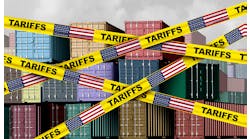Logistically Speaking: Supply Chain Leaders - Does Either Candidate Have Your Back?
Years ago, I heard a speaker talking about inspiration. He said that the quickest way to determine what motivates a person is to have them answer these three questions:
- What do you think about most?
- How do you spend your time?
- How do you spend your money?
Although the speaker wasn’t in sales, he could have been lecturing on Sales 101 because anybody with something to promote – whether it’s a product, a website, an ideology or a political candidate – has to first identify and then appeal to whatever is of the most interest to his/her listeners. Listening to our candidates for elected office, whether it be President Obama and Governor Romney or the various office-seekers throughout national, state and local campaigns, I’m struck by what topics these politicians center their campaign strategies on. We live in an era of governance by pollsters and focus groups, where whatever a candidate says to appeal to one demographic is quickly superseded by the interests of the next group he or she speaks to.
While doing research for this month’s cover story on the Presidential election, I did a deep dive into the two main candidates’ policy statements, their campaign websites, and their published and videotaped remarks. I even listened to President Obama and Congressman Paul Ryan speak in person this past month, while my colleague, Josh Cable, attended a Romney speech. Problem is, absent in all the rhetoric of how many jobs have been lost or gained or offshored was any clear statement on supply chain management. They just don’t talk about it.
This strikes me as more than a little bit odd, given that more than $1 trillion is spent in the United States every year on business logistics (primarily transportation and warehousing). Now admittedly, a trillion dollars doesn’t buy what it used to, but it’s still a significant chunk of change. You would think that all those people employed (or wanting to be employed) in manufacturing, retail and logistics industries – the human face of the U.S. supply chain – would be a large enough contingent that their interests would be worth addressing. But I’m not a politician, trained in the nuances of appealing to the lowest common denominator, so what do I know?
When the politicians do speak about global trade (which they rarely do), the focus is on how as a low-cost country, China is taking jobs away from American workers. Presumably, then, Messrs. Obama and Romney must believe that’s what their voters are most interested in, but that’s not the case at all. A recent study of importers and manufacturers conducted by Capital Business Credit suggests that supply chain managers are much more interested in moving some of their production out of China entirely, either in favor of even lower-cost countries (such as Vietnam and Pakistan) or back to the United States. If either candidate has talked about China’s decline as a supply chain force, and what policies the U.S. should follow when dealing with this exodus from China to other Asian hot spots, I must have missed it.
Similarly, in a just-released survey of 1,400 chief supply chain officers (CSCOs) conducted by SCM World, one of the biggest concerns CSCOs have about China is the shallow pool for talent in that country, and the depth of talent poaching that occurs. CSCOs are quite concerned about the rising costs of workers in China, followed by poor retention rates, which again points to their interests in looking elsewhere for talent, whether that be to other Asian countries or back in the U.S. That’s the kind of trend politicians should be identifying, emphasizing why bringing work home isn’t just a feel-good story for the local newspapers but in fact represents a significant shift in how goods will be made and shipped for years to come. But explaining how the global supply chain works can’t be summarized in a 20-second sound bite, so instead we never hear about these sorts of things, either from the politicians or the popular press who are supposed to be following these trends.
At this writing, early voting has already begun in some states, so the election is already upon us. In the absence of leadership from either candidate, supply chain leaders will themselves have to determine which candidate or political party comes closest to figuring out what matters most to you. Good luck.
Follow me on Twitter @supplychaindave.



